

Microblogging. Microblogging is a broadcast medium that exists in the form of blogging.
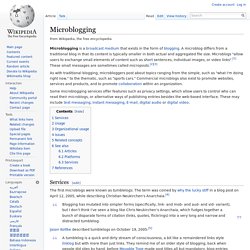
A microblog differs from a traditional blog in that its content is typically smaller in both actual and aggregated file size. Microblogs "allow users to exchange small elements of content such as short sentences, individual images, or video links".[1] These small messages are sometimes called microposts.[2][3] Follow Friday (followfriday) via Twitter... Hashtag.
A poster and shirt promote the #tampa Bay hashtag during the 2012 Republican National Convention Hashtags make it possible to group such messages, since one can search for the hashtag and get the set of messages that contain it.
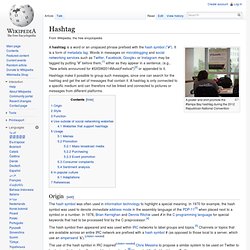
A hashtag is only connected to a specific medium and can therefore not be linked and connected to pictures or messages from different platforms. Origin[edit] The hash symbol then appeared and was used within IRC networks to label groups and topics.[5] Channels or topics that are available across an entire IRC network are prefixed with a hash symbol # (as opposed to those local to a server, which use an ampersand '&'). Twitter 'retweet' History Creation and initial reaction Twitter's origins lie in a "daylong brainstorming session" held by board members of the podcasting company Odeo.
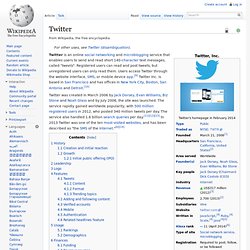
Dorsey, then an undergraduate student at New York University, introduced the idea of an individual using an SMS service to communicate with a small group.[15][16] The original project code name for the service was twttr, an idea that Williams later ascribed to Noah Glass,[17] inspired by Flickr and the five-character length of American SMS short codes. Troll. A troll is a class of being in Norse mythology and Scandinavian folklore.
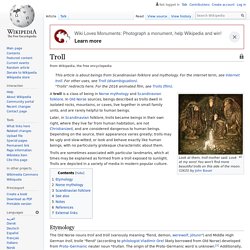
In Old Norse sources, beings described as trolls dwell in isolated rocks, mountains, or caves, live together in small family units, and are rarely helpful to human beings. Later, in Scandinavian folklore, trolls became beings in their own right, where they live far from human habitation, are not Christianized, and are considered dangerous to human beings.
Depending on the source, their appearance varies greatly; trolls may be ugly and slow-witted, or look and behave exactly like human beings, with no particularly grotesque characteristic about them. Trolls are sometimes associated with particular landmarks, which at times may be explained as formed from a troll exposed to sunlight. Trolls are depicted in a variety of media in modern popular culture. Etymology. Internet meme. A meme is "an idea, behavior, or style that spreads from person to person within a culture".[3] An Internet meme may take the form of an image, hyperlink, video, picture, website, or hashtag.
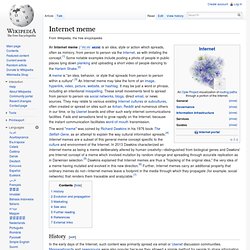
It may be just a word or phrase, including an intentional misspelling. These small movements tend to spread from person to person via social networks, blogs, direct email, or news sources. They may relate to various existing Internet cultures or subcultures, often created or spread on sites such as 4chan, Reddit and numerous others in our time, or by Usenet boards and other such early-internet communications facilities.
Fads and sensations tend to grow rapidly on the Internet, because the instant communication facilitates word-of-mouth transmission. History[edit] In the early days of the Internet, such content was primarily spread via email or Usenet discussion communities. Mashup (web application hybrid) In the past years[when?]
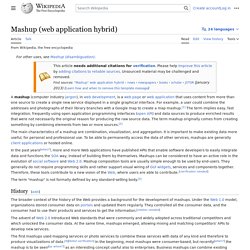
, more and more Web applications have published APIs that enable software developers to easily integrate data and functions the SOA way, instead of building them by themselves. Mashups can be considered to have an active role in the evolution of social software and Web 2.0. Mashup composition tools are usually simple enough to be used by end-users. They generally do not require programming skills and rather support visual wiring of GUI widgets, services and components together. Lurker. In Internet culture, a lurker is typically a member of an online community who observes, but does not actively participate.[1][2] The exact definition depends on context.
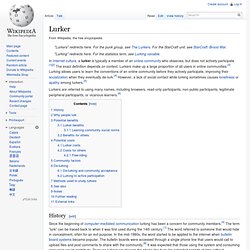
Lurkers make up a large proportion of all users in online communities.[3] Lurking allows users to learn the conventions of an online community before they actively participate, improving their socialization when they eventually de-lurk.[4] However, a lack of social contact while lurking sometimes causes loneliness or apathy among lurkers.[5] Lurkers are referred to using many names, including browsers, read-only participants, non-public participants, legitimate peripheral participants, or vicarious learners.[6] History[edit] Since the beginning of computer-mediated communication lurking has been a concern for community members.[4] The term “lurk” can be traced back to when it was first used during the 14th century.[7] The word referred to someone that would hide in concealment, often for an evil purpose.
Like button. Use on Facebook[edit] Facebook describes "liking" as a way for users to "give positive feedback and connect with things [they] care about.
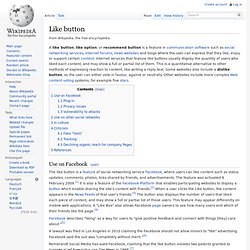
"[5] A lawsuit was filed in Los Angeles in 2010 claiming the Facebook should not allow minors to "like" advertising. Facebook said the suit was "completely without merit Rembrandt Social Media has sued Facebook, claiming that the like button violates two patents granted to Joannes Jozef Everardus van Der Meer in 1998.[7] Creative Commons. Creative Commons (CC) is a non-profit organization devoted to expanding the range of creative works available for others to build upon legally and to share.[1] The organization has released several copyright-licenses known as Creative Commons licenses free of charge to the public.
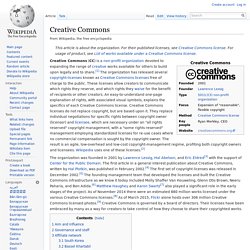
These licenses allow creators to communicate which rights they reserve, and which rights they waive for the benefit of recipients or other creators. An easy-to-understand one-page explanation of rights, with associated visual symbols, explains the specifics of each Creative Commons license. Creative Commons licenses do not replace copyright, but are based upon it.
They replace individual negotiations for specific rights between copyright owner (licensor) and licensee, which are necessary under an "all rights reserved" copyright management, with a "some rights reserved" management employing standardized licenses for re-use cases where no commercial compensation is sought by the copyright owner. Dr. Social Network 'Connections' Social network analysis (SNA) is the analysis of social networks.
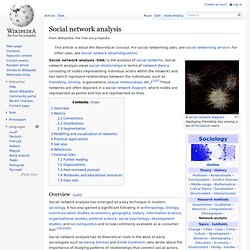
Social network analysis views social relationships in terms of network theory, consisting of nodes (representing individual actors within the network) and ties (which represent relationships between the individuals, such as friendship, kinship, organizations, sexual relationships, etc.)[1][2] These networks are often depicted in a social network diagram, where nodes are represented as points and ties are represented as lines. Overview[edit] Social network analysis has emerged as a key technique in modern sociology. It has also gained a significant following in anthropology, biology, communication studies, economics, geography, history, information science, organizational studies, political science, social psychology, development studies, and sociolinguistics and is now commonly available as a consumer tool.[3][4][5][6] Circles.
Google+ (pronounced and sometimes written as Google Plus /ˈɡuːɡəl plʌs/) is a social networking and identity service[3][4] that is owned and operated by Google Inc. Facebook 'friends' Facebook is a social networking website founded in 2004. This is a list of software and technology features that can be found on the Facebook website. Online chat. In this typical online chat program, the window to the left shows a list of contacts, and the window to the right shows a conversation between the user and one of those contacts Online chat in a less stringent definition may be primarily any direct text-based or video-based (webcams), one-on-one chat or one-to-many group chat (formally also known as synchronous conferencing), using tools such as instant messengers, Internet Relay Chat (IRC), talkers and possibly MUDs.
The expression online chat comes from the word chat which means "informal conversation". Blog. A blog (a truncation of the expression web log)[1] is a discussion or informational site published on the World Wide Web and consisting of discrete entries ("posts") typically displayed in reverse chronological order (the most recent post appears first). Until 2009 blogs were usually the work of a single individual, occasionally of a small group, and often covered a single subject. Avatar (computing) The word avatar originates in Hinduism, where it stands for the "descent" of a deity in a terrestrial form. (Deities in India are popularly thought to be formless and capable of manifesting themselves in any form.)
In Norman Spinrad's novel Songs from the Stars (1980), the term avatar is used in a description of a computer generated virtual experience. In the story, humans receive messages from an alien galactic network that wishes to share knowledge and experience with other advanced civilizations through "songs". The humans build a "galactic receiver" that describes itself: The galactic receiver is programmed to derive species specific full sensory input data from standard galactic meaning code equations.
From the last page of the chapter titled "The Galactic Way" in a description of an experience that is being relayed via the galactic receiver to the main characters: Digital curation. The term curation in the past commonly referred to museum and library professionals. It has since been applied to interaction with social media including compiling digital images, web links and movie files. Approaches to digital curation[edit] The Digital Curation Centre is a "world leading centre of expertise in digital information curation"[5] that assists higher education research institutions.
The DCC is based in the UK and began operations in early 2004. The following is a general outline of their approach to digital curation: Conceptualize: Consider what digital material you will be creating and develop storage options. RSS. News aggregator (newsfeed) News aggregator. Social bookmarking. Common features[edit]
Podcast.